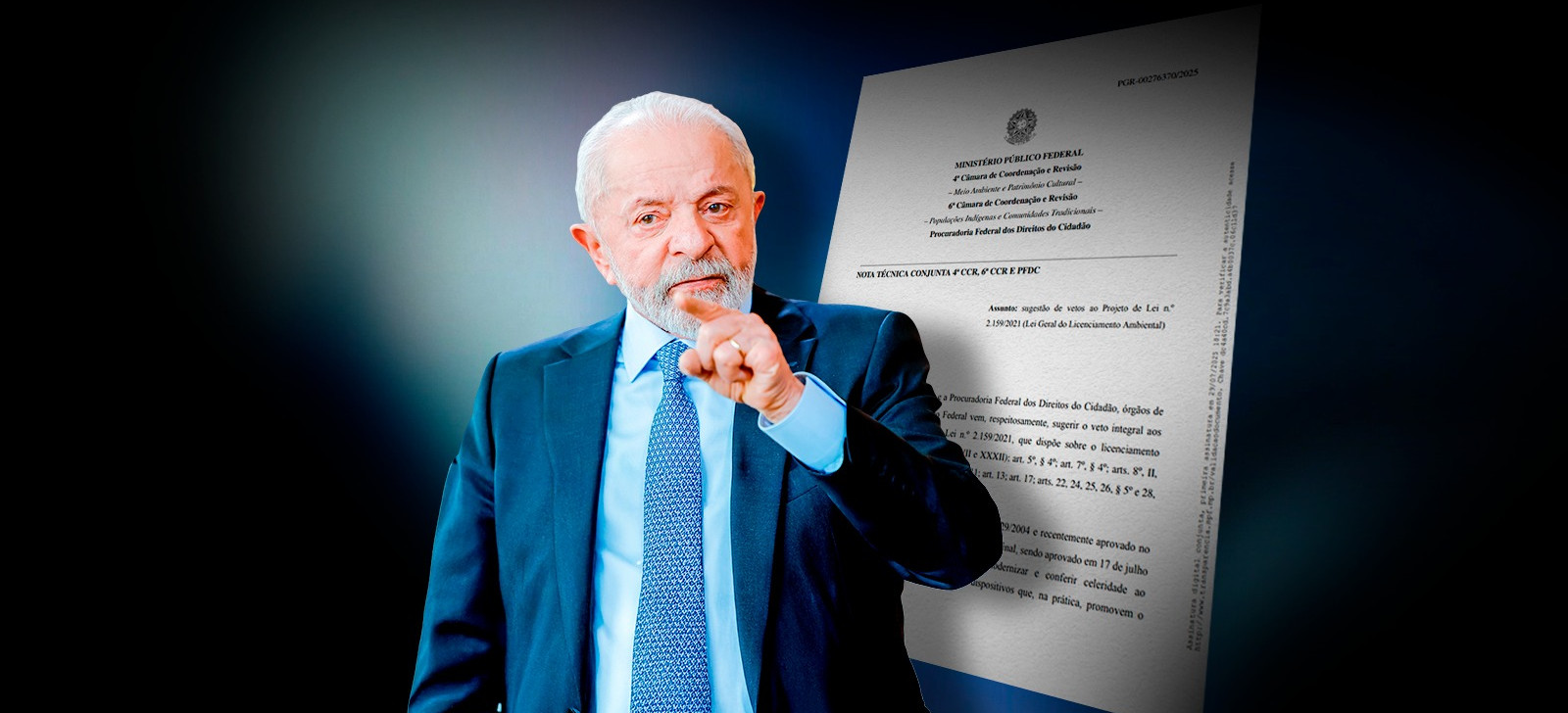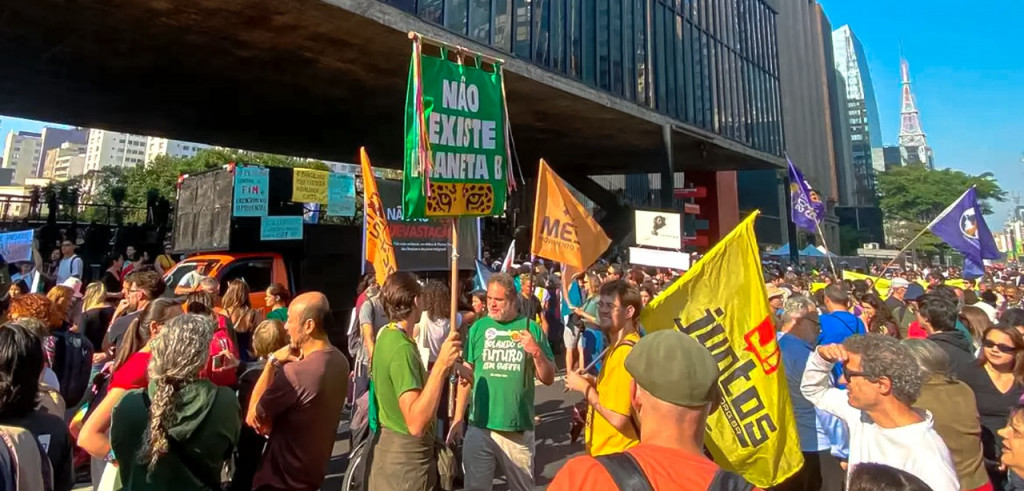Federal Prosecution Office urges Lula to veto 30 sections of the Environmental Licensing Bill
02 de August de 2025

By Ana Cláudia Leocádio – From Cenarium
BRASÍLIA (DF) – The Federal Prosecution Office (MPF) has increased pressure on President Lula to veto the General Bill on Environmental Licensing (Bill 2159/2021), known as the “Devastation Bill,” which was passed by the National Congress on the 17th of this month. The institution sent a technical note to the Presidential Palace last Tuesday, the 29th, recommending the veto of more than 30 provisions of the bill, citing violations of the Constitution, threats to environmental protection, and breaches of international treaties.
Also on Tuesday, the Minister of the Environment and Climate Change, Marina Silva, stated that the Ministry’s technical team is finalizing its analysis of the bill to support the president’s decision to either sanction or veto the measure, which consists of 60 articles and over 300 provisions. Lula has until August 8 to decide.
According to Marina, it’s not only the amendments introduced by the Senate that need to be assessed, but the bill as a whole, which environmentalists argue was already flawed when it left the House of Representatives, as it initiated the dismantling of the licensing process, considered a key tool for environmental protection in the country.

Within the federal government, while Marina’s ministry supports the veto, the Ministries of Mines and Energy and of Transportation have already expressed interest in the bill’s sanctioning, as many of the proposed changes would exempt strategic projects from environmental licensing. In Marina’s view, vetoing the bill is not enough: an alternative must be presented to restore the rules, which could mean submitting a new bill or a Provisional Measure to Congress.
The MPF’s technical note was prepared by the Chamber on the Environment and Cultural Heritage (4CCR), the Chamber on Indigenous Peoples and Traditional Communities (6CCR), and the Federal Prosecutor’s Office for Citizens’ Rights (PFDC), all upper bodies within the Prosecutor General’s Office (PGR).
The 13-page document states that the contested provisions “violate the Federal Constitution and contravene fundamental principles such as the right to an ecologically balanced environment and the rights of Indigenous Peoples over their lands, as well as the principles of public administration, the prohibition of environmental regression, effective protection, and federalism. The measure also goes against established Supreme Federal Court (STF) precedents in several specific rulings.”
The bill introduced new types of licensing, such as the Special Environmental License (LEA) and the License by Commitment and Adhesion (LAC), a kind of self-licensing, while exempting various sectors from licensing or extending licensing deadlines. According to the MPF, the STF has already ruled against such measures, as in the Direct Action of Unconstitutionality (ADI) 6.618, stating that “the simplification of procedures is only acceptable in cases of low environmental impact.”
More permissive licensing
The MPF also objects to the creation of more permissive licensing models, such as the exemption of licensing for sectors like agribusiness and infrastructure works; automatic license renewals; and the exclusion of institutions such as the National Foundation for Indigenous Peoples (Funai) from projects affecting unratified traditional territories.
The prosecutors who signed the document recall that the Supreme Federal Court (STF) has already ruled that “the territorial rights of Indigenous and quilombola peoples are original and do not depend on the formal conclusion of administrative processes.” In addition to hindering the evaluation of indirect impacts of large projects on these communities, the MPF argues that the approved bill violates the precautionary principle and the right to free, prior, and informed consultation, as established by Convention 169 of the International Labour Organization (ILO).
Another criticism is the removal of the requirement for registration in the Rural Environmental Registry (CAR) and the loosening of rules under the Atlantic Forest Law. “Although presented under the pretense of modernizing and speeding up the environmental licensing process, the approved text contains provisions that, in practice, dismantle one of the most important instruments of Brazilian environmental policy and the defense of human rights,” the MPF states in the document.
Violations and socio-environmental rollback
In concluding the technical note, the prosecutors further state that “the set of analyzed provisions constitutes a systematic violation of the principle prohibiting socio-environmental regression, recognized by the STF as stemming from Article 225 of the Federal Constitution.”
“Through self-licensing, the exemption of entire sectors, the elimination of technical analysis, and the weakening of requirements, the bill promotes a generalized dismantling of the licensing system, representing an unjustified rollback that jeopardizes the core of the right to the environment,” emphasize the prosecutors.
In addition to ILO Convention 169, the Paris Agreement—signed in 2015 to combat climate change—is also considered violated. According to the MPF, all this generates “a high risk of the country being held accountable by international courts, such as the Inter-American Court of Human Rights (IACHR).”
The MPF stated that it had already warned the National Congress several times about the risks of regression posed by the Licensing Bill, including in May 2024, when it submitted a document to the Senate detailing the environmental and social damage the rule changes would cause. This year, the MPF met again with the Federal Senate’s Environment Committee to discuss the measure and participated in public hearings on the subject.
Impact on unratified Indigenous Territories
A report published this Thursday, the 31st, by the InfoAmazônia portal shows that the Licensing Bill excludes 121 Indigenous Territories (ITs) in the Legal Amazon from protection zones surrounding major projects. This is because projects such as ports, railways, highways, mining ventures, wind farms, thermal plants, hydroelectric plants, and power lines may now be established around unratified ITs without consulting the National Foundation for Indigenous Peoples (Funai).
According to InfoAmazônia, of the 792 territories recognized by Funai in Brazil, 289 (36%) have not yet been ratified, with 121 of those located in the Legal Amazon—equivalent to 26% of the region’s ITs.
“The text also reduces the direct impact zone of projects, in the case of ratified Indigenous lands and those with restricted use for isolated communities in the Amazon biome. And it significantly reduces this buffer zone in other Legal Amazon biomes, such as the Cerrado and Pantanal, equating them to other regions of the country,” the report states.
Since the bill changes the term “Legal Amazon” to “Amazon Biome,” InfoAmazônia notes that, if fully sanctioned, the proposal will also reduce the protection radius for ratified ITs in the Amazon biome from 40 to 15 kilometers for highways; from 10 to 8 kilometers for railways, ports, thermal plants, and mining projects that require environmental impact assessments; from 40 to 30 kilometers for hydroelectric plants with reservoirs; and from 8 to 5 kilometers for transmission lines.

